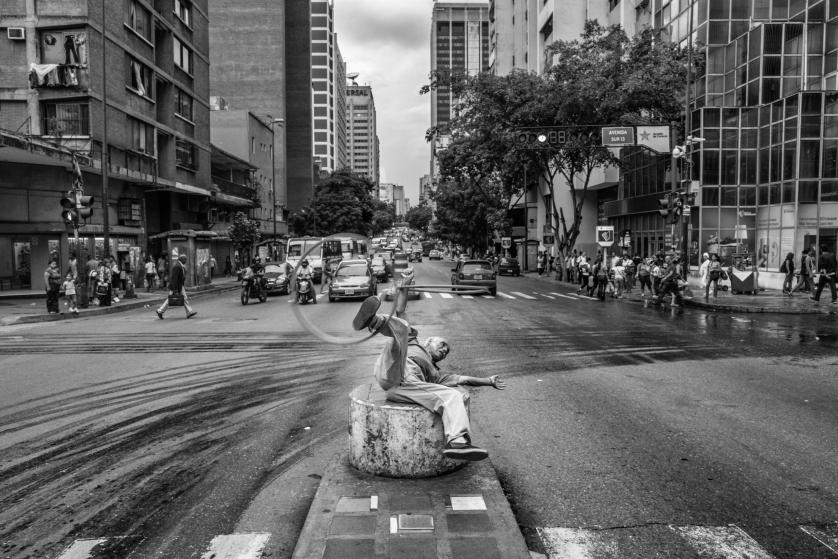WITNESSING A ‘COMPLETE COLLAPSE OF SOCIETY’ IN VENEZUELA

CARACAS, VENEZUELA – JUNE 2016: A street artist performs his show on Urdaneta Avenue. Caracas, like the rest of Venezuela, is a city on the brink of collapse because of the terrible economic and political crisis in the country. ( Photo by Alvaro Ybarra Zavala / Getty Images Reportage for Time.)
Olivier Laurent @olivierclaurent TIME
“I’m very scared of how it will end,” says photographer Alvaro Ybarra Zavala
A street performer in Caracas, where the economic and political crisis has escalated over recent months, bringing the country to the brink of total collapse, June 2016. Over the 17 years that Venezuela has been ruled by the socialist alliance of the late President Hugo Chavez, the country has been plagued by hyperinflation, a health crisis due to lack of medicines and deteriorating conditions in hospitals, food shortages, lack of electricity, explosive violent crime, and the rise of both left wing guerrillas and right wing paramilitary groups.
Protesters opposed to the revolutionary government of Nicolas Maduro run from police during a march that became violent. Demonstrations by the Venezuelan opposition are constant throughout the country, June 2016.
Prisoners inside a crowded cell at the Chacao municipal police station in eastern Caracas. There is no room to sit and prisoners take turns resting on sheets tied to bars like hammocks. Jails in Venezuela are seriously overcrowded with shortages of food and medicine. Because of the economic and political crisis, the number of prisoners grows daily as more Venezuelans are arrested for crimes, including mugging, kidnapping and murder, June 2016.
A protestor sits in front of police during a demonstration in Caracas. The Venezuelan opposition is calling for a referendum to recall the current government of President Nicolás Maduro. Amid spiraling triple-digit inflation, recession and shortages, Venezuela is on the brink of political and economic collapse, June 2016.
Alvaro Ybarra Zavala—Getty Images Reportage for TIME
Alvaro Ybarra Zavala puts it bluntly: “Venezuela has become hell.”
The photographer had just returned from one of his latest trips to the South American nation when he talked to TIME, and he was visibly affected by the chaos he had witnessed there. “There’s a complete collapse of society,” he said.
Once an example for the continent, Venezuela is now a country in freefall. “It’s hard to find food, there’s no medicine,” said Ybarra Zavala. “If you have to have surgery, you need to bring everything with you: the bandages, the gloves, everything. There are no anesthetics.”
Ybarra Zavala was on assignment for TIME last month, chronicling the country’s breakdown. His photographs show daily street protests that are often violently repressed, empty shelves in deserted grocery stores and people lining up, sometimes for entire days, for gas. “No one believes anymore in the army, in the police, in the system,” said Ybarra Zavala.
Security has also become an issue. “There’s now a very strong element of luck,” he said. “Access is a real nightmare. Not only do you need to be careful of the government, but also from the colectivos [militant groups] and the local militias. You’re limited on time, you’re limited in access. It’s a continuous fight.”
In fact, says the photographer—who’s worked in Iraq, Afghanistan and Colombia—Venezuela is the “hardest place I’ve worked in,” he said.
The collapse, set in motion by Hugo Chavez’s 14-year reign, now seems irreversible, he adds: “For the last four years, Venezuela has been in constant crisis and it never blew up. But now, I’m very scared of how it will end. I think Venezuela crossed the line of no return. I’m worried what will happen next.”
But Ybarra Zavala is not giving up. While each trip is more dangerous than the previous one, the 36-year-old photographer is ready to go back. “Memories are very important,” he said. “I think the Bolivarian revolution is a lost opportunity for Latin America to change things that needed to be changed. It’s so sad to see how a true feeling of a society has failed so much. And it shows how dangerous populism can be.”
Alvaro Ybarra Zavala is a photographer based in Spain. He is represented by Getty Images Reportage.
Alice Gabriner, who edited this photo essay, is TIME’s International Photo Editor.
Olivier Laurent is the editor of TIME LightBox. Follow him on Twitter and Instagram @olivierclaurent







Follow Us!